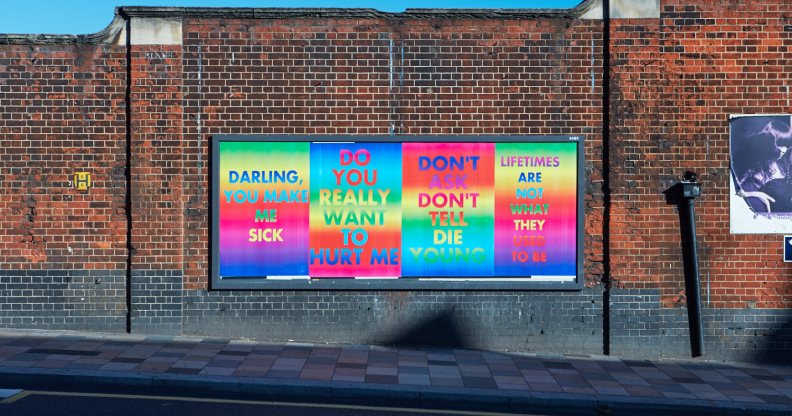LGBT+ activists edit artist’s posters amid fears of being ‘traumatic for those living with HIV’

(Tom Carter/The Estate of David McDiarmid/Studio Voltaire)
Public artworks by artist David McDiarmid have been ‘subverted’ by ACT UP: London in an attempt to represent a ‘current incarnation’ of his message.
Known for his political and personal responses to queer identity and his own experience with AIDS, some of David McDiarmid’s most iconic work has been publically displayed over the past year across sites in London. The project has been commissioned by Studio Voltaire in partnership with Art on the Underground and This is Clapham.
The Rainbow Aphorisms series is a collection of McDiarmid’s work featuring poster-style artwork with bold san-serif texts superimposed over rainbow colours. One poster, in particular, displaying the message ‘I’m too sexy to have AIDS’ has been met with criticism from London’s ACT UP movement.
Activists spray painted their own version of the McDiarmid poster, posting it alongside the promotional material, which instead said ‘I’m too sexy and I have HIV’.

(Act Up London)
Produced between 1993 and 1995, the posters are a cheeky depiction of McDiarmid’s commentary on queer identity and his own battle with AIDS, however, organisers of the activist group believe its messaging is no longer suitable in today’s society.
Artists Siobhan Fahey and Rebel Dykes, who are both members of ACT UP: London, told PinkNews: “We decided to spray paint a new message over the original words to continue the art’s necessity in the 21st Century, providing a clear, relevant and supportive message for those still affected by HIV today.”
A statement released on ACT UP London’s website said: “I would like to say that the main thrust of the action was never intended to censor the artist or to silence queer voices.”
“It’s important to point out that although the artwork may have been targeted at those that understand where this comes from, its current state is used out of context and isn’t helpful to the battles PLHIV (people living with HIV) fight today,” the statement added. The group believe that by using the artwork as promotional posters, its message could be taken out of context and has “the potential to be traumatic for those living with HIV.”
Activist Dan Glass told PinkNews: “We are forever thankful to David McDiarmid and every artist and activist who continues to push the boat out for our HIV+ community and in the spirit of ‘actions speak louder than words’ we took to the streets to further the conversation.”
Glass added that “art has always, and can always, be a weapon to tackle injustice,” while acknowledging that “the important work by Studio Voltaire and the ensuing debate surrounding the new output of his work are testament to that.”

(Act Up London)
Both Fahey and Dykes remain keen fans of McDiarmid’s work and believe he is an “important LGBT artist who responded to the issues of his day.” They said they were both indebted to artists like McDiarmid for their “bravery and strength of voice during the AIDS epidemic,” and they believe McDiarmid would understand where they’re coming from.
“We see this action as a collaborative effort, representing a current incarnation of McDiarmid’s message which still retains the sass, humour and power of his original words, but which reflects the reality of those living with HIV today,” they added.
Studio Voltaire told PinkNews that the aim of the project was “to help bring an underrepresented queer voice to a wider audience and contribute to both the historic and current narratives around HIV and AIDS.”
“We value ACT UP: London’s response to the series,” said curator Laura Harford and director Joe Scotland in a statement. “It was never our intention in presenting the series to cause any distress or upset, especially to those who are affected by HIV and AIDS.”
“We take on board the concerns and issues in presenting this work in the public realm without giving appropriate context,” they added.
While some venues were able to share further context into the artwork, Harford and Scotland said this wasn’t possible with the postered work across the city. The statement said: “We decided not to include any further information (including our website) on the works and to present them as the artist had originally intended. We were concerned that if we had done so the artworks might be misread as adverts or promotions.”

(Tom Carter/The Estate of David McDiarmid/Studio Voltaire)
The arts organisation added they are “committed to supporting underrepresented and emerging voices to a wider public,” and that they “remain open to discussion and criticism, and welcome any individuals or groups affected by this to contact us directly to continue this critical dialogue.”
“We now understand how this work in the series, when presented without any context and in isolation, can be read out of context. We apologise to those who were caused distress or upset,” their statement concluded.

